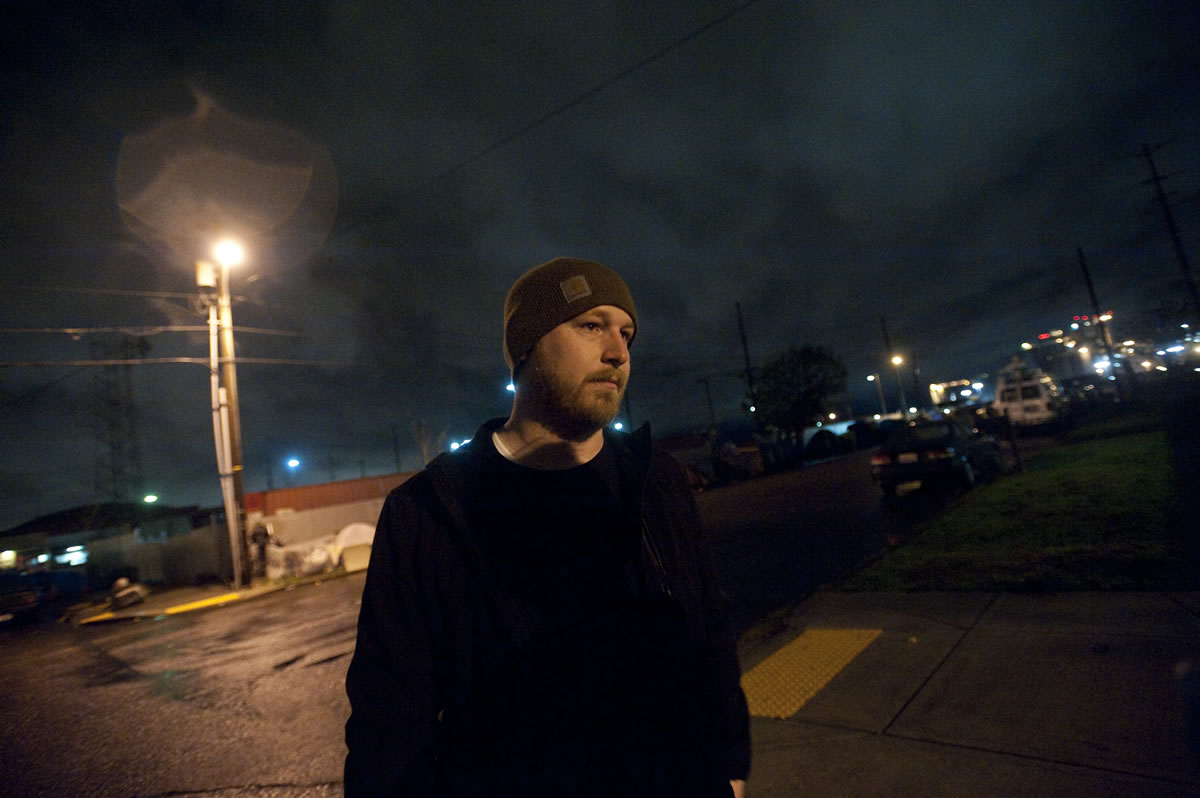A friend told David Ellis to take a drive through the tent city that’s sprouted around West 13th Street and Lincoln Avenue, to see firsthand the extent of homelessness in Vancouver.
What he saw downtown made him feel like helping, and so Ellis has been among the groups of armed volunteers patrolling the camp at night the past two weekends.
“I felt emotional about it,” said Ellis, who lives just outside of Vancouver. “You or I, even if we fell on hard times, maybe we have family to fall upon, too. But these guys don’t have anything; that’s why they’re here.”
Groups of volunteers have been patrolling the streets around the camp in an effort to help offer its residents a sense of security overnight. Some of these volunteer guards, Ellis among them, have been armed, alarming some neighbors, city officials and homeless advocates.
What happens next is in doubt. The weather took a nasty turn over the weekend, the city plans to start enforcing its camping ordinance Monday, and more shelter beds are opening, in theory nearly enough to accommodate all of the neighborhood campers.
Concerned for safety
Eileen Cowen runs Blanket Brigade, an informal service that collects and distributes donations to the county’s homeless, with her husband. She said after learning about the patrols that they would no longer work around the camp.
“We question whether assault rifles and handguns are necessary to keep people safe,” she said in the announcement on Blanket Brigade’s Facebook page. “We are concerned for the safety of our homeless friends, police and outreach personnel; we firmly assert that violence (or the threat thereof) is never, ever the answer.”
She said in an interview later that she and her husband will continue their work to help local homeless people, in the downtown camp and elsewhere, but they won’t be on scene at the camp.
“We kinda get what the real situation is, and we understand people want to be safe down there,” she said. “It’s hard, because I know that it makes a lot of people feel safe down there, a lot of people who feel like they haven’t had people looking out for them, and I understand that. … I’m sure everything will be totally fine, but all it takes is one loose shot and people die.”
How organized any of the patrols are varies. Ellis was out patrolling the streets Friday night with several close friends.
They’re not a “group,” he said, and he couldn’t speak to the motivations of other people who have taken it upon themselves to act as guards on other nights. He added it’s unfortunate that the politics surrounding firearms might obscure the larger problem of homelessness.
“This isn’t anywhere near a political issue,” he said. “We’re not down here for that. We’re down here for them.”
Some of Friday night’s volunteer guards had glow sticks tied to their belt loops and carried walkie-talkies. Ellis was armed that night, as were some of his friends, but they’re often armed, he said; they hold concealed-carry licenses.
On their volunteer patrol, they walk around the block, talk to people as they come and go, and radio each other if they see or hear something. Many camp residents have been largely appreciative; Ellis said many are glad to get a peaceful night’s sleep.
Out there, Ellis said, you’re essentially a guest in someone else’s home. Going beyond an “observe and report” role would be inappropriate, and likely illegal.
“Our job is to call the police, just like everybody else’s job is to,” he said. “Call the police, allow the police to handle the problem, because that is their job. Our job is to just help fill in that gap for the people that won’t call the police, maybe, or will just allow it to happen.”
Different tactics
As he understands it, on the first night of these patrols, a group of men openly carrying rifles and wearing tactical gear did the patrols. Some of them wore masks.
That was too much, he said, and it probably colored some people’s opinion toward the effort.
He doesn’t resent that early group’s right to open-carry weapons, but he said if he saw a bunch of people in tactical gear carrying assault-style rifles walking around his house, he’d probably be concerned, too.
“I think that’s what really wrote the narrative,” he said. “It’s your reaction to what they were dressed like and how they were personifying themselves.”
To Cowen and her husband, the best chance to meaningfully address homelessness will involve local government action and resources. She’s concerned armed citizens who’ve taken it upon themselves to be camp security guards can complicate relief efforts for agencies and elected officials.
“How can you encourage police to go in and take care of things? Is this vigilante group going to be taking care of security forever?” she said.
Cowen said she’s heard of violence and other crime at the camp, but said she’s worried the guards may actually make the camp less safe.
“I don’t like weapons. I know what they do and I don’t like being around people with weapons, because sometimes it doesn’t end up so great,” said Cowen, who, along with her husband, served in the Army.
Some advocates, some who work in the camp, have welcomed the patrols, but Cowen said some she’s spoken to privately share her concerns.
“I know some outreach people are unfazed, and I understand that as well. That’s their prerogative. If they want to keep going in there and feel safe, then good for them,” Cowen said.
Ellis said he hasn’t seen men with rifles on the nights he’s been in the camp, and said he’d probably leave if he did.
“Just like in any culture — basketball, skateboarding, pro-gun — there’s that group of individuals that take it to an extreme, but there’s certain times for certain things, and this is just to help out,” he said.
That some aid volunteers feel uncomfortable with the notion of armed patrolmen makes sense, he said, but they might be stuck on the image of masked men with assault-style rifles and tactical gear.
Concealed-carry license holders tend to be the safest kind of gun owners, he said.
“If somebody felt unsafe down here with our presence, (and) even in the rudest way possible delivered that message to us, we would politely leave,” he said.
‘Unsettling’
The camp has grown around Share House, a homeless shelter that also provides meals and other services. There were about 149 people living in the surrounding camp as of Share’s last count, said Amy Reynolds, the director of programs at the nonprofit social services agency.
“It’s been pretty unsettling for our clients, for our neighbors, to have people open-carrying in the streets,” Reynolds said.
She said Share staff talked to the police, but there’s little they can do.
“They’re exercising their rights to be out there, but certainly, we would not want anyone injured or to take the law into their own hands,” Vancouver Police Department spokeswoman Kim Kapp said. “We always encourage people, no matter what, to call the police when they need the assistance of a police officer.”
Kapp said the department has been receiving more calls for service related to criminal activity in the area.
The calls have included reports of crimes such as assaults, drug use and prostitution. Patrol officers have been out there “regularly” for such calls.
“They’re a vulnerable population, and you have predators in the community that are looking for opportunities to prey on people,” she said.
The department and city are aware of the volunteer patrols, she said, and the police haven’t received any complaints about them.
For months, similar armed groups have been standing guard outside of military recruitment offices in Vancouver without incident, she said.
The volunteer patrols might end up out of work soon: Winter shelter beds will open in the coming weeks, and the city plans to step up enforcement of its new camping ordinance starting Monday.
The city has been dropping off garbage bins around the camp for people to throw things away, and social workers have been at the camp to connect residents with shelter spaces or other services.
Until then, Reynolds said, people walking around with guns will still unsettle some.
“We’ve certainly also heard a lot of concerns, and I feel like the city shares our concern that we could be heading for a tragic situation,” Reynolds said.
Ellis said he and his friends’ brought along cases of water bottles and tarps Friday, and had planned to buy a bunch of meat at Costco and hold a barbecue for the campers. When they were rained out, they went to a nearby McDonald’s and bought 150 or so cheeseburgers.
Early that evening, Ellis saw a family come by in a van to drop off a large tent and some blankets.
Whatever people’s opinions on guns are, he said, he hopes more people look past that at the larger problem.
“We’re just here to help them so we know that the people down here are feeling safe,” he said. “We wish that the narrative was a little more leaned toward — the city of Vancouver has a homeless problem and they need help.”
Amy M.E. Fischer of The Columbian contributed to this story.




